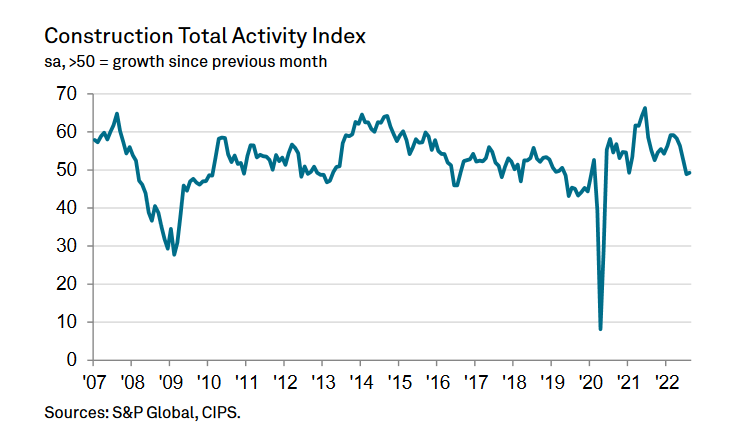‘Bold’ policies required after construction activity falls for second consecutive month

The data was collected between August 12 and 30
UK construction companies suffered a second straight month of contraction in the face of deep uncertainty about the outlook for the inflation-hit economy, a survey of purchasing managers showed today.
The S&P Global / CIPS UK Construction PMI was at 49.2 in August, up fractionally from 48.9 in July but still below the 50.0 no-change mark and thus signalling a reduction in construction activity over the month. Activity has now decreased in two consecutive months.
As was the case in July, civil engineering posted the sharpest decline in activity of the three monitored categories, seeing output fall markedly over the month. Commercial activity also declined, thereby ending a period of growth stretching back for a year-and-a-half. On a more positive note, activity on housing projects increased for the first time in three months, albeit fractionally.
While some firms increased activity in response to ongoing growth of new orders, this was outweighed by those constructors that saw output decline as firms adjusted to signs of demand weakening.
New orders increased only marginally in August, and to the least extent since June 2020. Some respondents indicated that customers were holding back on committing to new
orders amid cost pressures.
Alongside inflationary pressures, concerns around the potential for a wider economic downturn also impacted the sector in August. Business confidence dropped in July and
was well below the series average.
Andrew Harker, economics director at S&P Global Market Intelligence, which compiles the survey, said: “The UK construction sector looks set to be in for a challenging period, according to the latest PMI data. Not only did construction activity fall for the second month running, but a range of indicators from the survey pointed to further weakness ahead. New orders slowed to a crawl, while concerns about the sector and the wider economy led to a drop in confidence.
“Activity weakness was broad-based in August, with none of the three monitored categories immune to the wider slowdown. Commercial activity dropped into contraction for the first time in just over a year-and-a-half, and while housing activity ticked higher, the segment has been in broad stagnation over the past three months.
“Price and supply pressures showed further signs of easing as waning demand throughout the sector lifted pressure on suppliers. Meanwhile, the main positive from the latest survey was a solid increase in employment. That said, hiring at least in part reflects an ongoing catch-up following the pandemic. If activity continues to fall, firms will likely soon feel that their staffing capacity is sufficient and pause hiring.”
Dr John Glen, chief economist at the Chartered Institute of Procurement & Supply, said: “The UK construction sector is poised for contraction once again as rising prices for raw materials worldwide filtered into UK supply chains. Just 14 months since the sector’s recent peak as part of the recovery from the pandemic, inflation is seeing housing and commercial building stagnate with civil engineering activity dropping significantly.
“There is some consolation for the sector as it readies itself for a future of high energy costs, however. Lower demand is leading to fewer purchases, downward pressure on input costs and more responsive supply chains. Together, these trends could eventually help to reverse inflation, but a prolonged dip in new orders will be a bitter pill for the sector to swallow.”
The Federation of Master Builders (FMB) said the figures should be a wake-up call that bold new policies are needed to help kickstart building activity to support economic growth.
Brian Berry, chief executive of the FMB, said: “This new construction data shows that the industry has returned to its pandemic levels of activity. As the cost-of-living crisis deepens, consumers are cutting back, but builders also face increased costs on materials. This creates a difficult and clearly damaging situation. Bold solutions are required by the new Government under Liz Truss.
“Delivering a UK wide retrofit strategy to improve the efficiency of the nation’s homes would be a huge boost for local builders and local economies alike. It would also cut homeowners bills and help ensure the UK’s energy security. More immediately we urge the Government to remove VAT on repair, maintenance and improvement work so that savings can be passed on to cash strapped consumers.”
Mark Robinson, group chief executive at SCAPE, said the industry will be looking to the Prime Minister for urgent help with energy bills, but the impact of any intervention is unlikely to be immediate and firms must work with closely with each other if they’re to survive the upcoming recession.
He added: “Another month of declining activity is further evidence of market uncertainty created by inflation, as developers focus on getting existing projects over the finish line, before pressing ahead with new ones.
“With the construction sector’s energy bills set to rise more than five-fold, industry leaders will be looking to the new Prime Minister Liz Truss to tame inflation and deliver some stability for forward planning. The impact of any intervention is unlikely to be immediate though, so the industry should be working now to ensure that the supply chain is shielded as much as possible from the worst effects of the upcoming recession.”
Gareth Belsham, director of the national property consultancy and surveyors Naismiths, said: “As the recessionary vice begins to close on the UK economy as a whole, the construction industry’s brakes are being squeezed harder and faster than most.
“The industry has now spent two months in contraction territory, with both infrastructure and commercial property construction activity shrinking in August. Housebuilders provided a rare glimmer of light after residential activity ticked up for the first time in three months.
“But the flood of new orders seen at the start of the year is slowing to a trickle. New orders barely rose in August, and growth is now at the lowest level seen since the depths of the 2020 summer lockdown.
“Business confidence among construction firms, which typically provide a canary in the coalmine for the wider economy, continues to decline and August saw Britain’s builders reduce their orders for materials and scale back recruitment.
“This cooling of demand did ease some of the inflationary pressure though, and input cost inflation has now dipped to its lowest level for 18 months.
“Looking ahead, rising interest rates are likely to make some developers reassess their plans and will eventually cool demand from housebuyers too.
“For now most construction firms are busy and order books remain relatively full – but the picture for 2023 is looking increasingly grim.”





















